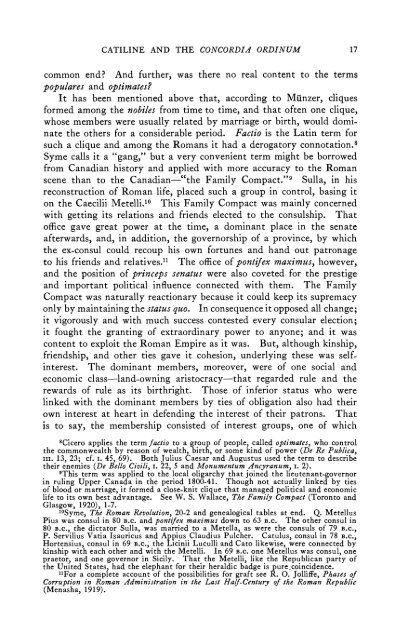Catiline and the "Concordia Ordinum" - Historia Antigua
Catiline and the "Concordia Ordinum" - Historia Antigua
Catiline and the "Concordia Ordinum" - Historia Antigua
Create successful ePaper yourself
Turn your PDF publications into a flip-book with our unique Google optimized e-Paper software.
CATILINE AND THE CONCORDIA ORDINUM 17<br />
common end? And fur<strong>the</strong>r, was <strong>the</strong>re no real content to <strong>the</strong> terms<br />
populares <strong>and</strong> optimates?<br />
It has been mentioned above that, according to Miinzer, cliques<br />
formed among <strong>the</strong> nobiles from time to time, <strong>and</strong> that often one clique,<br />
whose members were usually related by marriage or birth, would dominate<br />
<strong>the</strong> o<strong>the</strong>rs for a considerable period. Factio is <strong>the</strong> Latin term for<br />
such a clique <strong>and</strong> among <strong>the</strong> Romans it had a derogatory connotation.8<br />
Syme calls it a "gang," but a very convenient term might be borrowed<br />
from Canadian history <strong>and</strong> applied with more accuracy to <strong>the</strong> Roman<br />
scene than to <strong>the</strong> Canadian-"<strong>the</strong> Family Compact."' Sulla, in his<br />
reconstruction of Roman life, placed such a group in control, basing it<br />
on <strong>the</strong> Caecilii Metelli.o0 This Family Compact was mainly concerned<br />
with getting its relations <strong>and</strong> friends elected to <strong>the</strong> consulship. That<br />
office gave great power at <strong>the</strong> time, a dominant place in <strong>the</strong> senate<br />
afterwards, <strong>and</strong>, in addition, <strong>the</strong> governorship of a province, by which<br />
<strong>the</strong> ex-consul could recoup his own fortunes <strong>and</strong> h<strong>and</strong> out patronage<br />
to his friends <strong>and</strong> relatives." The office of pontifex maximus, however,<br />
<strong>and</strong> <strong>the</strong> position of princeps senatus were also coveted for <strong>the</strong> prestige<br />
<strong>and</strong> important political influence connected with <strong>the</strong>m. The Family<br />
Compact was naturally reactionary because it could keep its supremacy<br />
only by maintaining <strong>the</strong> status quo. In consequence it opposed all change;<br />
it vigorously <strong>and</strong> with much success contested every consular election;<br />
it fought <strong>the</strong> granting of extraordinary power to anyone; <strong>and</strong> it was<br />
content to exploit <strong>the</strong> Roman Empire as it was. But, although kinship,<br />
friendship, <strong>and</strong> o<strong>the</strong>r ties gave it cohesion, underlying <strong>the</strong>se was self-<br />
interest. The dominant members, moreover, were of one social <strong>and</strong><br />
economic class-l<strong>and</strong>-owning aristocracy-that regarded rule <strong>and</strong> <strong>the</strong><br />
rewards of rule as its birthright. Those of inferior status who were<br />
linked with <strong>the</strong> dominant members by ties of obligation also had <strong>the</strong>ir<br />
own interest at heart in defending <strong>the</strong> interest of <strong>the</strong>ir patrons. That<br />
is to say, <strong>the</strong> membership consisted of interest groups, one of which<br />
8Cicero applies <strong>the</strong> term factio to a group of people, called optimates, who control<br />
<strong>the</strong> commonwealth by reason of wealth, birth, or some kind of power (De Re Publica,<br />
in. 13, 23; cf. I. 45, 69). Both Julius Caesar <strong>and</strong> Augustus used <strong>the</strong> term to describe<br />
<strong>the</strong>ir enemies (De Bello Civili, I. 22, 5 <strong>and</strong> Monumentum Ancyranum, I. 2).<br />
9This term was applied to <strong>the</strong> local oligarchy that joined <strong>the</strong> lieutenant-governor<br />
in ruling Upper Canada in <strong>the</strong> period 1800-41. Though not actually linked by ties<br />
of blood or marriage, it formed a close-knit clique that managed political <strong>and</strong> economic<br />
life to its own best advantage. See W. S. Wallace, The Family Compact (Toronto <strong>and</strong><br />
Glasgow, 1920), 1-7.<br />
s0Syme, The Roman Revolution, 20-2 <strong>and</strong> genealogical tables at end. Q. Metellus<br />
Pius was consul in 80 B.c. <strong>and</strong> pontifex maximus down to 63 B.c. The o<strong>the</strong>r consul in<br />
80 B.c., <strong>the</strong> dictator Sulla, was married to a Metella, as were <strong>the</strong> consuls of 79 B.c.,<br />
P. Servilius Vatia Isauricus <strong>and</strong> Appius Claudius Pulcher. Catulus, consul in 78 B.c.,<br />
Hortensius, consul in 69 B.c., <strong>the</strong> Licinii Luculli <strong>and</strong> Cato likewise, were connected by<br />
kinship with each o<strong>the</strong>r <strong>and</strong> with <strong>the</strong> Metelli. In 69 B.c. one Metellus was consul, one<br />
praetor, <strong>and</strong> one governor in Sicily. That <strong>the</strong> Metelli, like <strong>the</strong> Republican party of<br />
<strong>the</strong> United States, had <strong>the</strong> elephant for <strong>the</strong>ir heraldic badge is pure.coincidence.<br />
"For a complete account of <strong>the</strong> possibilities for graft see R. O. Jolliffe, Phases of<br />
Corruption in Roman Administration in <strong>the</strong> Last Half-Century of <strong>the</strong> Roman Republic<br />
(Menasha, 1919).

















